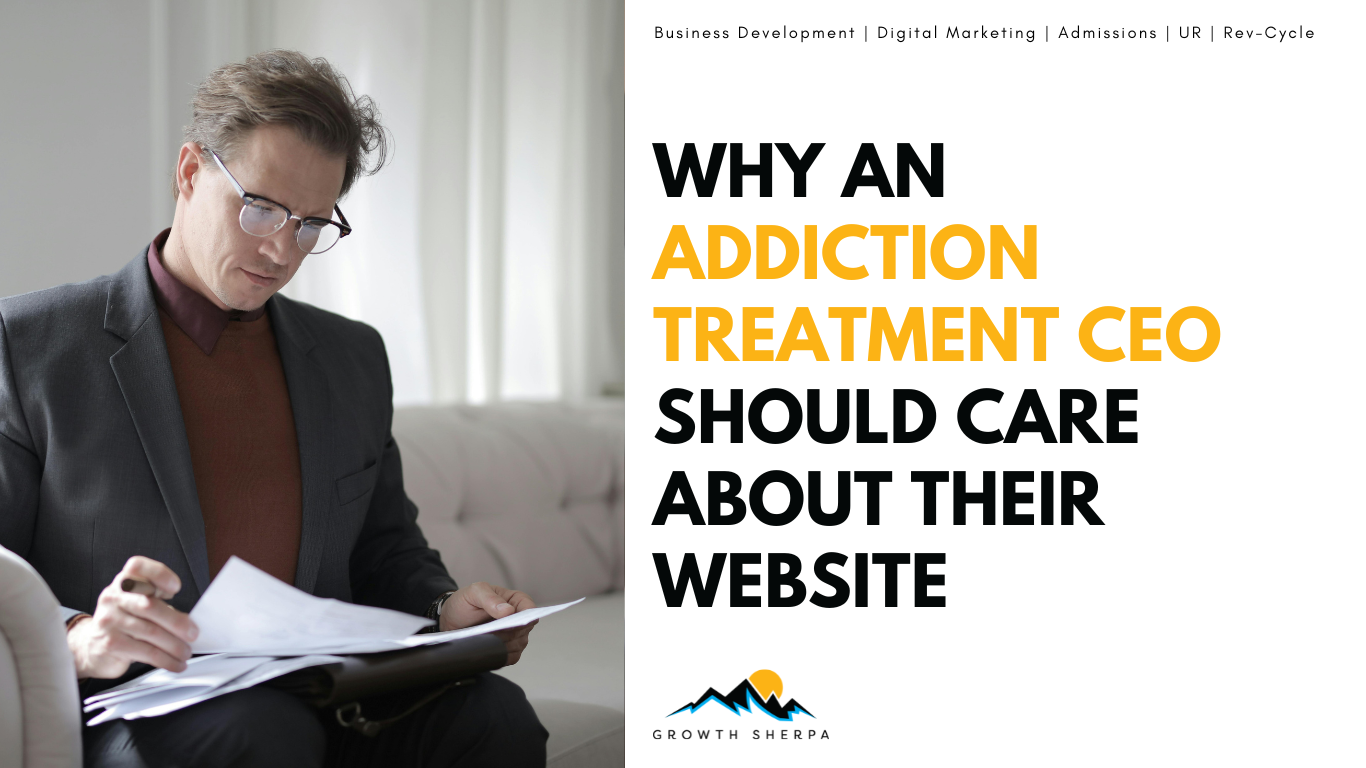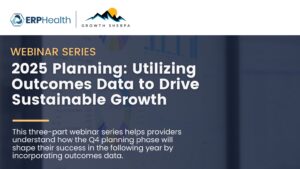For the CEO of an addiction treatment provider, the website might not immediately come to mind as a strategic priority. It’s easy to focus on clinical care, operations, staffing, or compliance while relegating the company website to the marketing team. However, in today’s digital-first world, a well-designed and optimized website is no longer a nice-to-have—it’s a pivotal tool that directly impacts your company’s success. A strategically built website has the power to enhance your company’s brand, solidify referral relationships, and, most importantly, increase patient volume. Whether someone is seeking help for themselves or a loved one, or if a professional is looking for a trusted partner to refer patients to, your website often serves as their first impression of your organization.
Here is why your website deserves attention at the highest level of leadership, explaining how it influences your company’s success, supports referral relationships, and drives patient volume.
Your Website as the Digital Front Door
In the addiction treatment industry, trust is everything. Prospective patients and their families are looking for a facility they can trust during one of the most vulnerable times of their lives. For many, your website is the first place they’ll look to evaluate your credibility.
Establishing Credibility and Building Trust: A poorly designed website can erode confidence in your organization before someone even speaks with your admissions team. Conversely, a professional, well-organized site with clear information, testimonials, and accreditations communicates that your facility is both trustworthy and capable of providing quality care.
Reflecting Your Brand Identity: Your website is the digital representation of your organization. It should reflect the same level of professionalism and compassion that your team brings to patient care. If your website doesn’t align with your mission and values, it can create a disconnect that undermines your brand.
Building Referral Relationships
While patient acquisition is a key focus for your website, it also plays a critical role in fostering relationships with referral sources. Whether it’s therapists, physicians, or other addiction treatment centers, referral partners want to feel confident that their clients will receive the best possible care.
A Showcase for Your Expertise: Your website should clearly communicate what sets your organization apart. Highlight your clinical team’s qualifications, unique programs, and treatment outcomes. By doing so, you demonstrate to referral partners that their patients will be in good hands.
Easy Access to Referral Information: A referral partner visiting your website should be able to quickly find the information they need, whether it’s a referral form, a dedicated contact number, or details about your admissions process. Simplifying this process can strengthen trust and streamline collaboration.
Educational Content for Professionals: Providing resources such as white papers, blog posts, or webinars targeted at professionals shows that you’re committed to advancing the field of addiction treatment. This content not only positions your organization as a thought leader but also deepens your relationships with referral sources.
Increasing Patient Volume
For addiction treatment providers, the website is the single most important tool for attracting patients in today’s competitive landscape. More people than ever are searching for addiction treatment services online, and your website must be optimized to meet them where they are.
Search Engine Optimization (SEO): If your website isn’t optimized for search engines, potential patients may never find you. SEO ensures that your facility ranks higher on search engine results pages (SERPs) for terms like “addiction treatment near me” or “rehab in [city].”
Key SEO strategies for addiction treatment websites include:
- Using keywords that align with what people are searching for, such as “detox programs” or “dual diagnosis care.”
- Creating high-quality, informative content that answers common questions about addiction and treatment.
- Building local SEO by optimizing for location-specific terms and securing listings on directories like Google Business Profile.
Compelling Calls-to-Action (CTAs): Your website should guide visitors toward taking the next step, whether it’s filling out a contact form, making a phone call, or starting a live chat. Clear and compelling CTAs like “Get Help Now” or “Verify Your Insurance” can significantly increase conversions.
Mobile Optimization: More than half of all internet searches now happen on mobile devices. If your website isn’t mobile-friendly, you risk alienating a significant portion of your audience. A responsive, fast-loading site ensures that prospective patients have a positive experience, no matter what device they’re using.
Data-Driven Insights
A well-built website doesn’t just attract visitors—it provides invaluable data about their behavior. As a CEO, understanding how people interact with your site can inform strategic decisions about marketing, admissions, and service offerings.
Tracking Key Metrics: Analytics tools can reveal how many visitors your site receives, which pages they spend the most time on, and where they drop off. These insights can help you identify areas for improvement, such as optimizing underperforming pages or refining your CTAs.
Lead Attribution: A robust website paired with the right tech stack can track how leads find your facility—whether through organic search, social media, or referral traffic. This data helps you understand which marketing channels are driving the most patient inquiries, allowing you to allocate resources more effectively.
Supporting Admissions
Your admissions team relies on your website to educate and engage prospective patients before they even pick up the phone. A well-designed website makes their job easier by prequalifying leads and providing the information patients need to feel comfortable taking the next step.
Answering Common Questions
Your website should address the most common concerns people have about addiction treatment, such as:
- What types of insurance do you accept?
- What’s the admissions process like?
- What are the available treatment options?
By answering these questions upfront, you reduce friction in the decision-making process and empower your admissions team to focus on closing leads.
Highlighting Testimonials and Success Stories
Stories of hope and recovery resonate deeply with people considering treatment. Featuring testimonials or videos of alumni sharing their experiences can inspire confidence and encourage prospective patients to reach out.
Differentiating Your Facility in a Competitive Market
Addiction treatment is a highly competitive industry, with facilities often vying for the same pool of patients. A strong website helps you stand out by showcasing what makes your organization unique.
Specialized Programs: If your facility offers specialized programs—such as LGBTQ+ treatment, trauma-focused therapy, or family counseling—make sure these services are prominently featured on your website. Tailored content can attract niche audiences looking for specific care.
Accreditation and Certifications: Displaying accreditations, such as CARF or Joint Commission certification, adds credibility to your facility and reassures visitors of your commitment to high standards.
Overcoming Common Website Challenges
Despite its importance, many addiction treatment providers struggle with maintaining an effective website. Some common challenges include:
- Outdated Design: A website that looks like it hasn’t been updated in years can harm your credibility.
- Slow Load Times: Pages that take too long to load can drive visitors away before they even see your content.
- Lack of Clear Navigation: Visitors should be able to find key information, like treatment options and contact details, with ease.
Investing in regular website audits and updates ensures that your site remains a valuable asset rather than a liability.
A Worthy Investment
For a CEO, prioritizing the company’s website might seem like a significant investment of time and resources. However, the returns in terms of patient volume, referral relationships, and brand reputation are well worth it. Your website is not just a marketing tool—it’s an extension of your mission to help individuals and families on their journey to recovery.
By ensuring your website is professional, informative, and optimized for search engines, you’re laying the foundation for sustained growth and success in a competitive industry. A strong website not only drives leads but also builds trust, strengthens partnerships, and amplifies the impact of your organization.
In the end, a well-designed and optimized website isn’t just an asset for your marketing team—it’s a critical driver of your company’s overall success.




